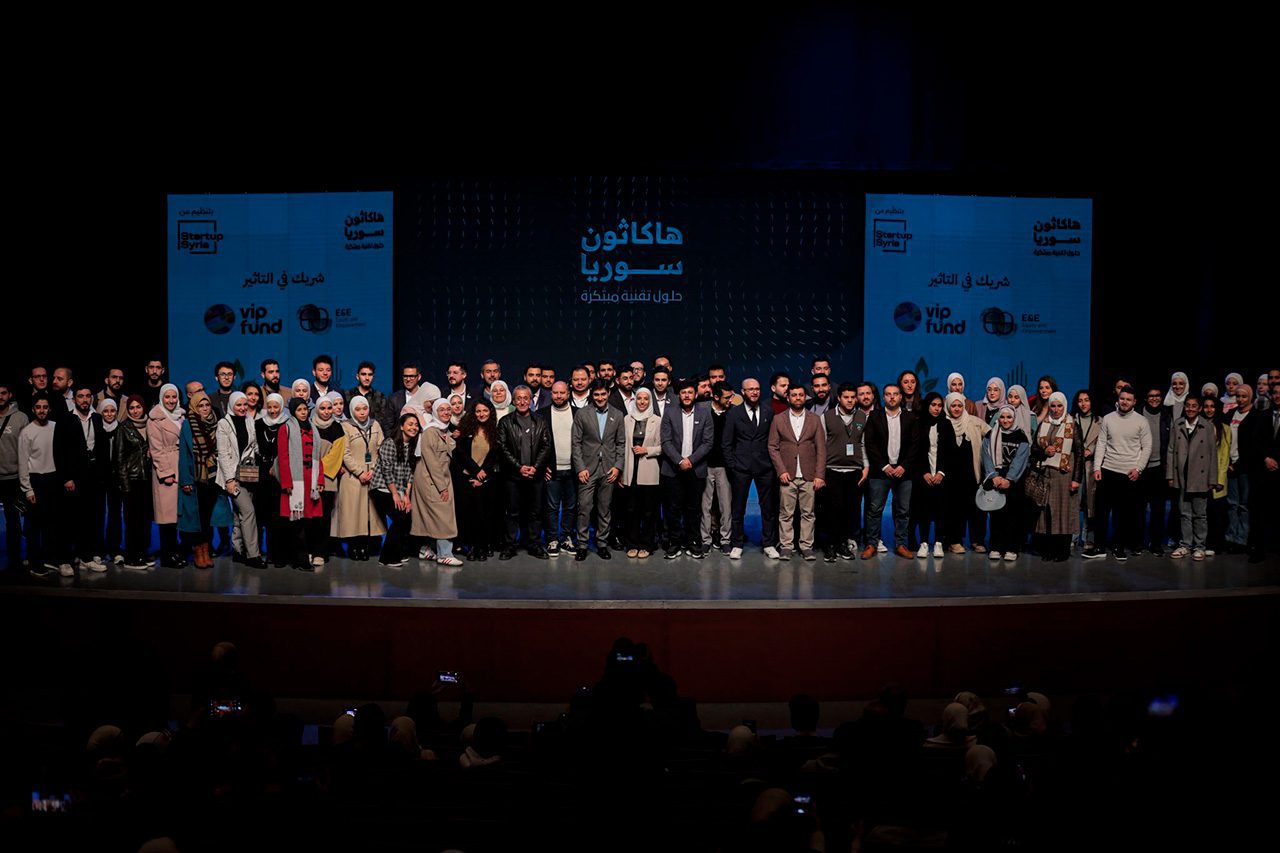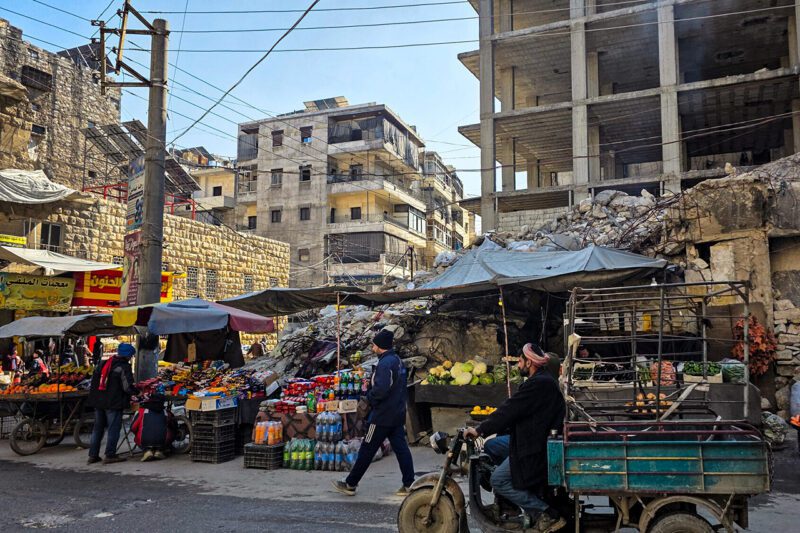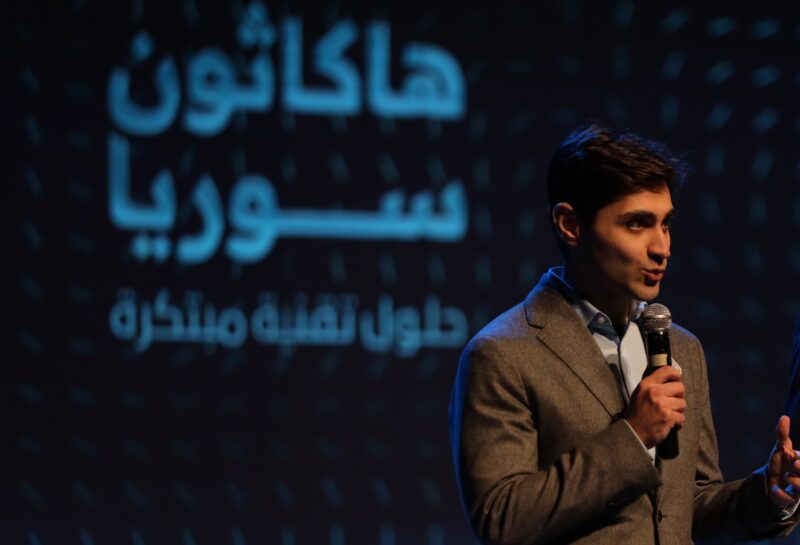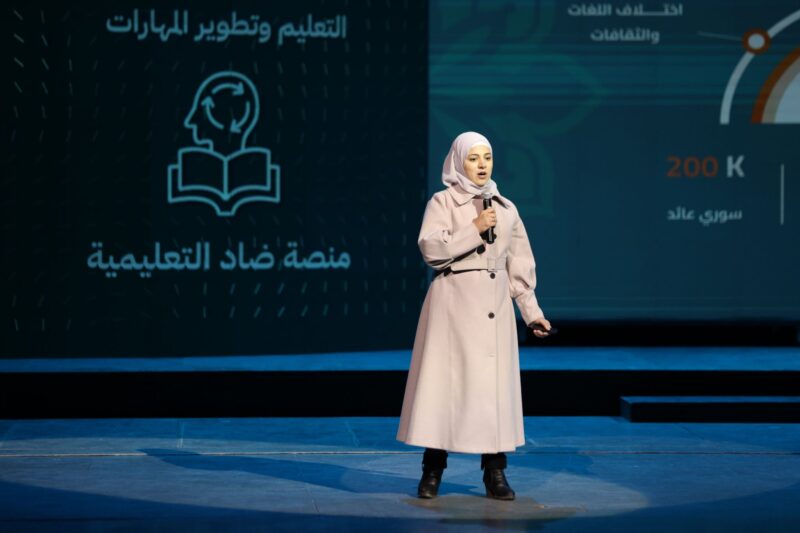Inclusion: A Critical Foundation for a Prosperous “Next Normal”

Hack for Syria participants
After fourteen years of destruction and displacement, Syria stands at a pivotal turning point following its recent regime change. What role will impact entrepreneurs play in rebuilding its economy and society?
Syria’s economy has severe challenges as the country emerges into this new era. As of late 2024, more than 90% of Syrians lived below the poverty line and nearly 70% depended on humanitarian aid. Meanwhile, as aid budgets have steadily shrunk over the years, only 12.5% of the $1.25 billion UN-coordinated humanitarian response for Syria has been funded. New solutions are urgently needed in vital sectors such as shelter, water and sanitation, and food security, as well as to revitalize the economy.

Food supplies in a market in Aleppo; Courtesy of NRC
A March 2025 Norwegian Refugee Council (NRC) assessment found that despite trade liberalization and new policies post-Assad, local markets remain unable to absorb new workers, especially amid potential refugee returns. According to NRC, “Syria needs investments that can support small businesses and provide job opportunities in projects such as those repairing civilian infrastructure.”
Entrepreneurship is not only a driver of economic growth and jobs. It also generates the innovations needed to meet humanitarian and development challenges and fosters social cohesion. In Syria, as in other post-conflict countries, it is poised to be a key strategy for renewal. In Rwanda, Afghanistan, and Iraq, entrepreneurship has helped create jobs, reintegrate displaced populations, and build local industries after periods of conflict and instability.
Entrepreneurship is not only a driver of economic growth and jobs. It also generates the innovations needed to meet humanitarian and development challenges and fosters social cohesion.
Syria’s entrepreneurial potential is evident in its diaspora. Over half of Syria’s population remains displaced, and, in their new economies, Syrians have thrived as business leaders. Across Germany, the Gulf, Canada, Turkey, the UK, and beyond, displaced Syrians have founded startups, joined accelerators, and contributed to business networks. They are now well-positioned to contribute to Syria’s economic renewal. In Turkey alone, over 10,000 small businesses started by Syrian entrepreneurs have boosted regional exports, built local partnerships, and played a critical role in the recovery after the devastating earthquakes of 2023. Displaced Syrian entrepreneurs around the world, such as Razan Alsous in the UK, Tareq Haddad in Canada, Anas Alakkad in Germany, and so many others, have built companies that not only enrich their new communities but also create visibility and global ties for Syria.
In addition, the country’s young, entrepreneurial talent has been nurtured through Syrian-led efforts such as Jusoor, Karam Foundation, and VIP.fund. These initiatives support displaced and conflict-affected youth with education, mentorship, and entrepreneurial training, preparing them for the future of work and technology.
Syrian ecosystem builder Ahmad Sufian Bayram’s journey also reflects this potential. During his 12 years abroad, he has cultivated the startup culture for Syria. On his first visit to his country after the recent regime change, he found many challenges that technology and entrepreneurship could help solve along with a growing local interest. In fact, his recent research shows that the number of Syrians who viewed entrepreneurship as “extremely important” grew from 26% in 2015 to over 80% in 2024.

Ahmad Sufian Bayram on stage
In February 2025, Ahmad and a global team of volunteers led a powerful demonstration of Syria’s entrepreneurial appetite and potential: Hack for Syria. The hybrid hackathon drew over 5,000 participants in just two weeks, far exceeding the organizers’ expectations, bringing together Syrians across political and geographic divides to build solutions for rebuilding the country. Ahmad emphasizes the significance of this event, noting that “for the first time in 14 years, we had one event happening at the same time in all the different cities inside Syria.” Three-fourths of the participants were inside Syria, joining through local hubs to ensure access for those without reliable internet or electricity. The remaining participants joined online from 45 countries, primarily from Turkey, Germany, Lebanon, and Saudi Arabia. Over 97% of the participants were Syrian nationals. “Syrians are not waiting for international aid or sanctions relief to start rebuilding,” Ahmad says, “we are ready to build our own future.” Indeed, with the hackathon’s focus on “speed recovery” for Syria, the participants’ familiarity with the local context and needs was crucial for coming up with feasible solutions.
The number of Syrians who viewed entrepreneurship as “extremely important” grew from 26% in 2015 to over 80% in 2024.
Based on the applications submitted, over 200 teams were formed to work on ideas in infrastructure and public services; education and skills development; healthcare and medical access; economic development and employment; food security and agriculture; and peace and social cohesion. Working within these six categories, the teams developed their ideas into business models, supported by mentors who joined them online.
The 16 finalist teams, selected by local experts, presented their solutions at a public demo day at the Damascus Opera House. These included a drone-powered landmine detection system using AI and thermal imaging (Amman); a mobile learning platform aligned with Syria’s national curriculum (Study Loop); an e-commerce platform helping Syrian artisans reach global buyers (FromSyrians); an AI-powered medical chatbot connecting patients with doctors (Medit); and a platform using GIS and remote sensing to help farmers save water, boost yields, and adapt to climate change (RiSat).

Beyond these finalists, Ahmad says, “every single idea that would contribute to the Syrian speed recovery is an important idea.” He is currently planning to showcase all of the ideas generated during the program, so that others can invest, mentor, and support them. He also adds that these teams’ intention is to not only support Syria with their startups but also other countries where their solutions may be needed.
Despite all this abundant talent, ideas, and energy, access to capital poses a bottleneck. Economic sanctions continue to block progress, and declining development assistance further restricts funding for startup training and ecosystem growth. Ahmad and his team are already working with a network of impact investors, many based in neighboring countries or within the diaspora, who are eager to support Syrian startups. Although the EU eased restrictions on key sectors in February 2025, U.S. sanctions remain in place, limiting financial transactions and stifling entrepreneurial momentum. Combined with the collapse of U.S. aid infrastructure, this moment risks becoming a missed opportunity to support Syrian-led development solutions through grants, technical assistance, and blended finance.
Syria’s recovery depends on the willingness of global impact economy stakeholders to recognize and engage with its emerging entrepreneurial ecosystem.
This funding vacuum must be urgently addressed, partially through philanthropic capital and impact investors focused on development-oriented enterprises, and more substantially through coordinated public-private partnerships and regional investment efforts. While some Syrian startups have secured investments between $5,000 and $100,000, scaling these businesses will require far larger and more flexible pools of capital, especially across healthcare, education, infrastructure, and green energy. As outlined in the recent “Reimagining Syria: A Roadmap for Peace and Prosperity Beyond Assad” report from the Middle East Institute, rebuilding efforts will require robust investment in digital and physical infrastructure, clear financial mechanisms to navigate sanctions, structural engagement of Syria’s diaspora, transnational trade deals, and targeted economic diplomacy to ensure long-term viability for Syrian businesses.
As Ahmad wrote in a recent Wamda article, “supporting Syrian entrepreneurs is not just an investment in a post-conflict economy — it is an investment in the human spirit’s capacity to rebuild, thrive, and inspire.” His words are a reminder that Syria’s recovery depends on the willingness of global impact economy stakeholders to recognize and engage with its emerging entrepreneurial ecosystem. Hack for Syria extends this invitation, not only to investors, but to mentors, ecosystem builders, and partners ready to support a new generation of entrepreneurs driving Syria’s renewal.
Related Content
Comments
Deep Dives
RECENT
Editor's Picks
Webinars
News & Events
Subscribe to our newsletter to receive updates about new Magazine content and upcoming webinars, deep dives, and events.
Become a Premium Member to access the full library of webinars and deep dives, exclusive membership portal, member directory, message board, and curated live chats.
At Impact Entrepreneur, we champion fearless, independent journalism and education, spotlighting the inspiring changemakers building the Impact Economy. Diversity, equity, sustainability, and democracy face unprecedented threats from misinformation, powerful interests, and systemic inequities.
We believe a sustainable and equitable future is possible—but we can't achieve it without your help. Our independent voice depends entirely on support from changemakers like you.
Please step up today. Your donation—no matter the size—ensures we continue delivering impactful journalism and education that push boundaries and hold power accountable.
Join us in protecting what truly matters. It only takes a minute to make a real difference.
0 Comments